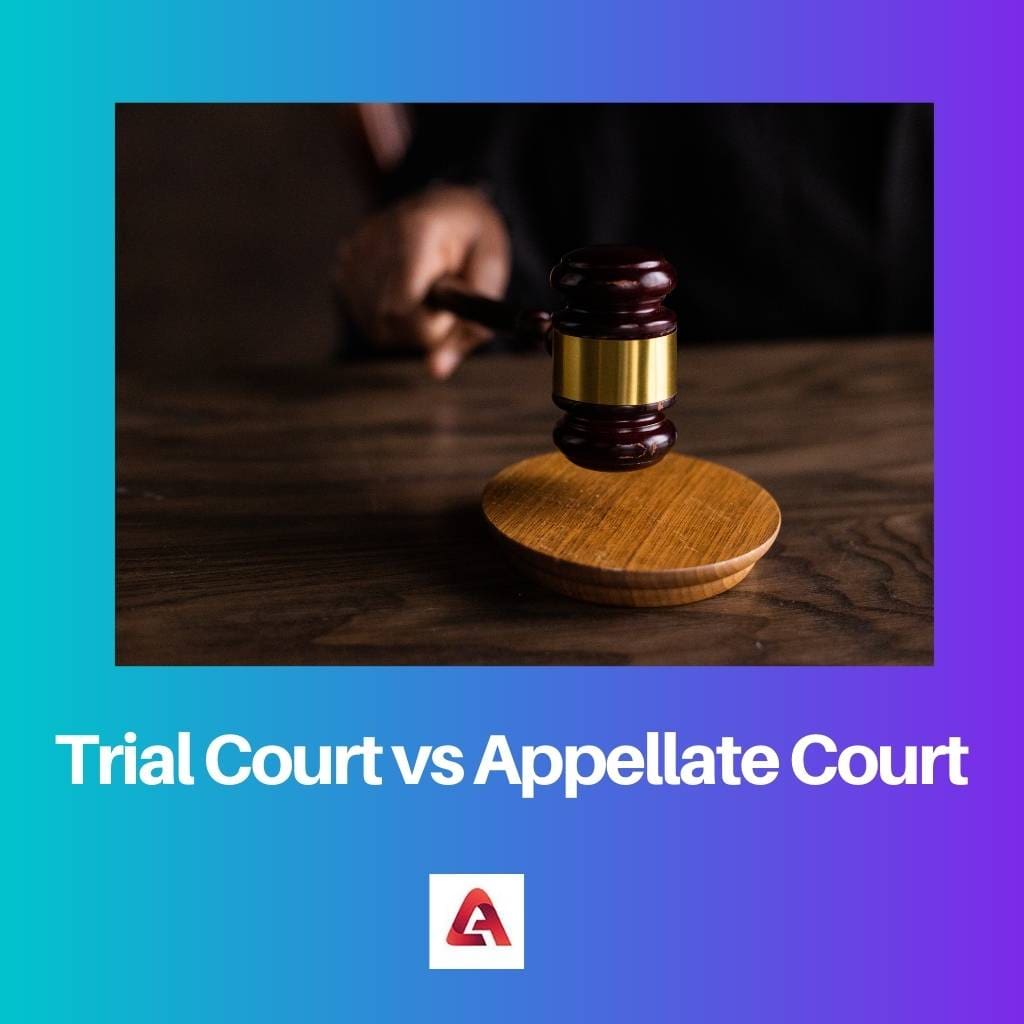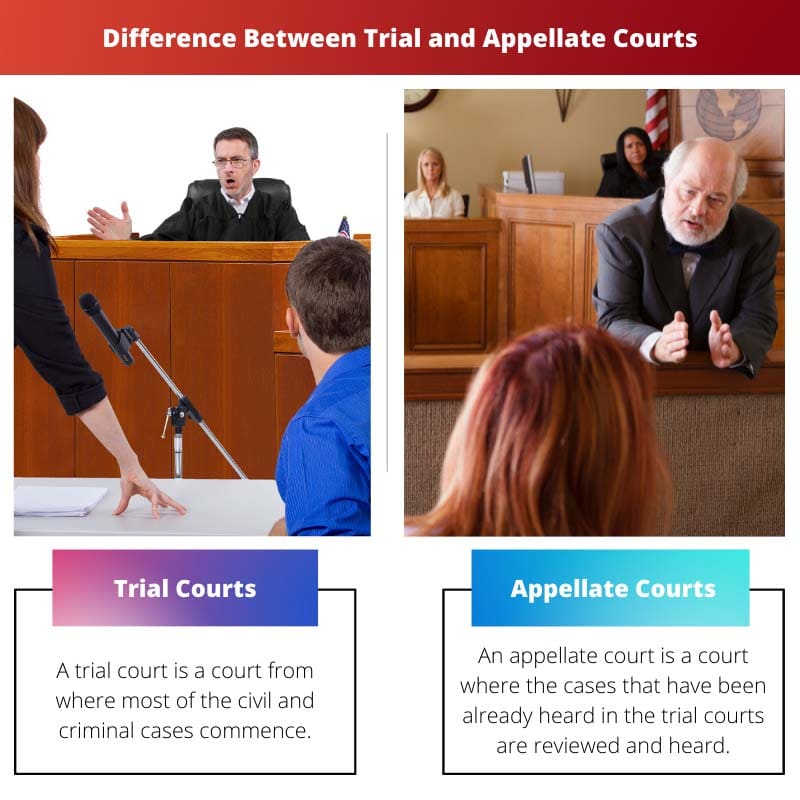The judiciary plays a vital role in the maintenance of law and order all across the country. It works in coordination with the Legislature and Executive to establish the rule of law in the nation.
There are various types of courts and two of them are Trial Courts and Appellate Courts.
Key Takeaways
- Trial courts are where cases are initially heard and evidence is presented, while appellate courts review decisions made by trial courts.
- Trial courts have a judge and a jury, while appellate courts only have a panel of judges.
- In trial courts, the focus is on determining the facts of a case, while appellate courts focus on interpreting the law.
Trial Court vs Appellate Court
Trial courts are the courts of first instance, where legal disputes are initially heard and decided upon, and the purpose is to determine the facts of a case and to apply the law to those facts to reach a verdict or judgment. Appellate courts are courts that review decisions made by lower courts.

Trial courts are known as the court of original jurisdiction and are the starting point of all civil and criminal cases. All the findings and witnesses are presented in the court to arrive at a decision.
The Trial courts may be of limited jurisdiction or general jurisdiction. They are also popularly known as district courts.
Appellate courts are also known as courts of appeal. Their sole function is to review and hear appeals of cases that have already been heard in the lower trial courts.
If the appeal is genuine and strong, then the Appellate courts may also reverse the trial court’s decision.
Comparison Table
| Parameters of Comparison | Trial Court | Appellate Court |
|---|---|---|
| Definition | A trial court is a court from where most of the civil and criminal cases commence, and they are heard by taking into consideration all the witnesses and facts. | An appellate court is a court where the cases that have been already heard in the trial courts are reviewed and heard. |
| Time limit | There is no time limit imposed. The trial can take place for even several months. | There is a time limit imposed that can be even 1 day. |
| Evidence Presentation | The trial court takes into consideration all the facts, witnesses and testimony of both sides. | The Appellate courts do not hear any new witnesses and testimony of either side. It only judges the judgement of the Trial court. |
| Ruling party | Both the judges and jury are present and have different roles to play. | The Appellate courts have only judges and no jury, and the cases have been heard by 2 or 3 judges. |
| Consequences | The Trial court decision only affects the parties to the suit. | The Appellate court decision affects a large number of people due to the binding nature of the decision. |
What is Trial Court?
Trial Court is also known as the court of the first instance, as cases are initially heard in the trial courts, whether they are civil cases or criminal cases. The two sides present evidence and testimony, and on this basis, the judge or the jury makes a decision on the fate of the case.
There are basically two types of Trial courts, one is of general jurisdiction, and another one is of limited jurisdiction. The Trial court of General jurisdiction is allowed to hear any civil or criminal case that is not solely under the administration of another court.
The Trial court of Limited jurisdiction only hears certain cases of a specific type based on the criteria like the subject matter, amount of sensitivity, and various others. One of the major examples of Trial courts with limited jurisdiction is the municipal courts.
During the course of the trial, the prosecutor makes use of all the witnesses and testimony to reach a conclusion and deliver the decision. All the district courts of India are also known as Trial courts.

What is Appellate Court?
Appellate courts are basically known as courts of appeal and review cases that have already been heard in the Trial courts. They do again take into consideration the already heard witnesses and evidence but review the judgement made by the Trial court.
The Appellate courts are available for both state and federal-level cases and matters. The Appellate courts also see whether the Trial court has correctly applied the course of law.
There are three basic types of appellate reviews. The first one is the retrial of the case, which means that the Appellate Court hears the case for the second time and makes fresh findings of the facts.
The second one allows the court to hear the witnesses again and also supplement their testimony by taking into consideration the additional evidence. The third type of review is based on a set of written records.
The reviewing court does take into consideration any pieces of evidence but reviews only the judgement passed by the Trial court.
Main Differences Between Trial and Appellate Courts
- The trial court is known as the court of the first instance, whereas Appellate courts are known as the court of appeal.
- The decision of the Trial court affects the parties to the suit, whereas the decision of the Appellate court affects more people involved in the case.
- In the Trial court, both judge and jury can hear the case, whereas in the Appellate court, only the judges review the case.
- The Trial court does not impose any sort of time limit on the trial. It may even take several years to hear the case and reach a conclusion, whereas the Appellate Court imposes a specific time limit on the hearing.
- The Trial court hears district matters, whereas the Appellate court hears both district and federal matters and cases.

- https://heinonline.org/hol-cgi-bin/get_pdf.cgi?handle=hein.journals/brklr41§ion=27
- https://www.aeaweb.org/articles?id=10.1257/aer.103.4.1360

The article effectively outlines the fundamental differences between the trial courts and the appellate courts. This understanding is essential for anyone interested in the judicial process.
Agreed. It’s an important aspect of our legal system to discern between these courts and their functions.
The article’s insightful comparison helps in understanding the diverse roles of trial and appellate courts. It’s a valuable read.
The article does an excellent job in explaining the differences between trial courts and appellate courts, along with the functions and responsibilities of each. It’s an important aspect of our legal system.
Absolutely, the article’s thorough comparison and explanation of the two court types is highly informative and provides clarity on their roles.
Indeed, understanding these courts helps in understanding judicial processes and legal proceedings, making this article quite insightful.
The article presents a detailed insight into trial and appellate courts, shedding light on their roles and implications within the legal system.
Absolutely, understanding these courts is crucial and the article provides an informative guide to them.
The article’s detailed comparison between trial and appellate courts is essential for understanding their distinct functions and roles in the legal system.
Absolutely, the differences between the trial and appellate courts are clearly explained in the article, making it a valuable resource.
The article provides a comprehensive comparison of trial and Appellate Courts and the functions of both. It’s important to understand the differences as they are crucial institutions in maintaining law and order.
You’re right. This distinction is crucial in our legal system and the article provides clear definitions and applications of these courts.
The comparison between trial courts and appellate courts is clearly and effectively explained in this article. Quite a valuable read.
Indeed, the article’s detailed explanation is quite comprehensive and helps in understanding the roles of these courts.
The article aptly explains the key features and functions of both trial courts and appellate courts. It’s a valuable resource for those interested in the legal system.
The comparison table in the article effectively summarizes the differences between trial and appellate courts, aiding in clear comprehension.
Absolutely, the article provides a clear distinction between the trial and appellate courts, contributing to a better understanding of the legal proceedings.